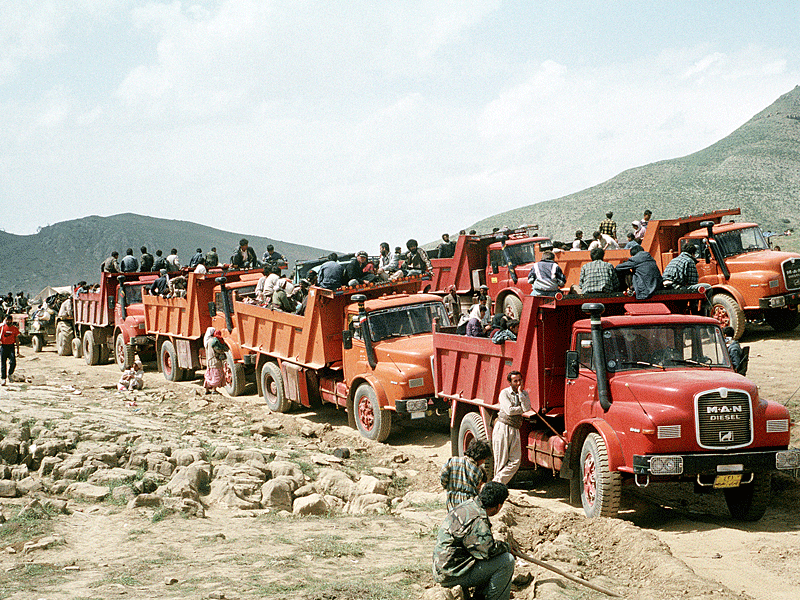Not long ago, Rabbi Baruch Frydman-Kohl was speaking to an acquaintance who’s originally from Mosul, Iraq. The man had been in touch with relatives back home and relayed disturbing news. They told him people from ISIS had scrawled the Arabic letter nun on the door of their house.
Nun is the first letter in the word “Nazarene” and was used to identify the family as Christian, Rabbi Frydman-Kohl said.
Contemplating what he’d heard, the rabbi wondered “what it would be like if in Canada in 1939, ’40, ’41, ’42, I got a call from a relative in Europe. How would I feel?”
Rabbi Frydman-Kohl, however, is not without resources. As co-chair of the Canadian Rabbinic Caucus and active in multifaith dialogue, he joined with Most Rev. Douglas Crosby, head of the Canadian Conference of Catholic Bishops, to write a letter to Foreign Affairs Minister Stéphane Dion, hoping to focus the minister’s attention on the issue.
READ: Jewish Canadians raise funds to rescue Yazidi refugee families
The letter calls on the federal government to “make a priority of advocating for at-risk Christian communities throughout the Middle East and Africa, and likewise explore new and effective ways of providing diplomatic and humanitarian assistance to alleviate their suffering.” Rabbi Frydman-Kohl is hoping to follow up the letter with a personal meeting with Dion.
The letter cites a report that “between 200 million and 230 million [Christians] face daily threats of murder, beating, imprisonment and torture, and a further 350 million to 400 million encounter discrimination in areas such as jobs and housing.” It further cites findings by the Pew Research Center that “Christians around the world face more persecution, restrictions, hostility and harassment than any other religious group.”
Rabbi Frydman-Kohl said he began to take more of an interest in the issue after a meeting late last winter hosted by the then-minister of immigration and attended by local representatives of minority Middle East religions.
In attendance were spokespeople from Eastern Christian churches – Christianity’s earliest churches – as well as Yazidis, Roman Catholics, Anglicans and the United Church. The focus of the meeting was refugee relief and how to preserve indigenous Middle Eastern religious groups. Soon after, Canada announced it would welcome 10,000 Syrian refugees.
“I became more sensitized to their plight, and I began to do my own reading,” Rabbi Frydman-Kohl said.
He learned the ancient churches were facing persecution in the region. Jews, too, had faced discrimination and danger, and 850,000 were forced to abandon their communities in the Middle East and North Africa. The vast majority settled in Israel, the Jews’ ancestral homeland, but for the members of the churches, “this is their historic homeland… They want to remain. They don’t want to re-settle in Canada. They want to remain close to their communities.”
By bringing their concerns to Dion’s attention, the religious leaders are adding their “moral voice” to the issue, Rabbi Frydman-Kohl said.
Bishop Crosby said the idea for the joint letter arose at a meeting of the Catholic-Rabbinic Caucus dialogue.“We want the Canadian government to be aware, first of all,” he said. “It’s a new government. I think the idea is that if the two of us sign [the letter], it might capture the attention of the minister and demonstrate we’re aware of this.”
Bishop Crosby told The CJN that grave reports are filtering out of the region. “The Christian community in the Middle East is diminishing, because people are fleeing. They fear for their lives,” he said.
The situation for Christians in Iraq and Iran is particularly dire, but there are also Christian refugees from Syria fleeing the conflict there, he added.
Rev. Karen Hamilton, general secretary of the Canadian Council of Churches, representing 25 Christian denominations, applauded the letter for highlighting the plight of Christians. “People are being persecuted for their religion in a region that is the birthplace of Christianity,” she said.
She said Dion should invite Rabbi Frydman-Kohl and Bishop Crosby to discuss the issue, and she suggested other steps to highlight the plight of Christians in the Middle East and North Africa: promote it for discus- sion at the United Nations; make it an agenda item when faith leaders meet and when world leaders meet; and continue to welcome refugees, among them Christians.
